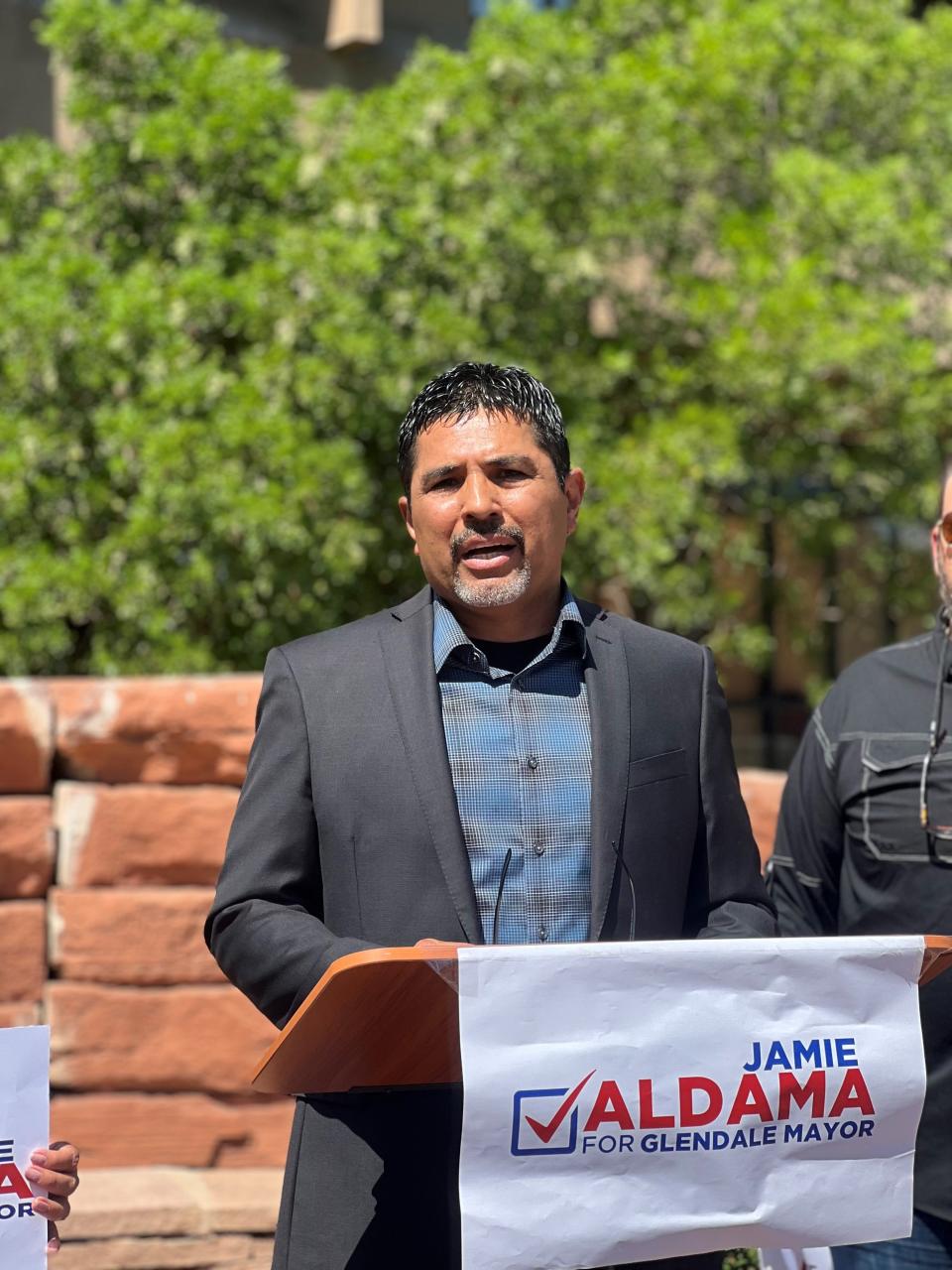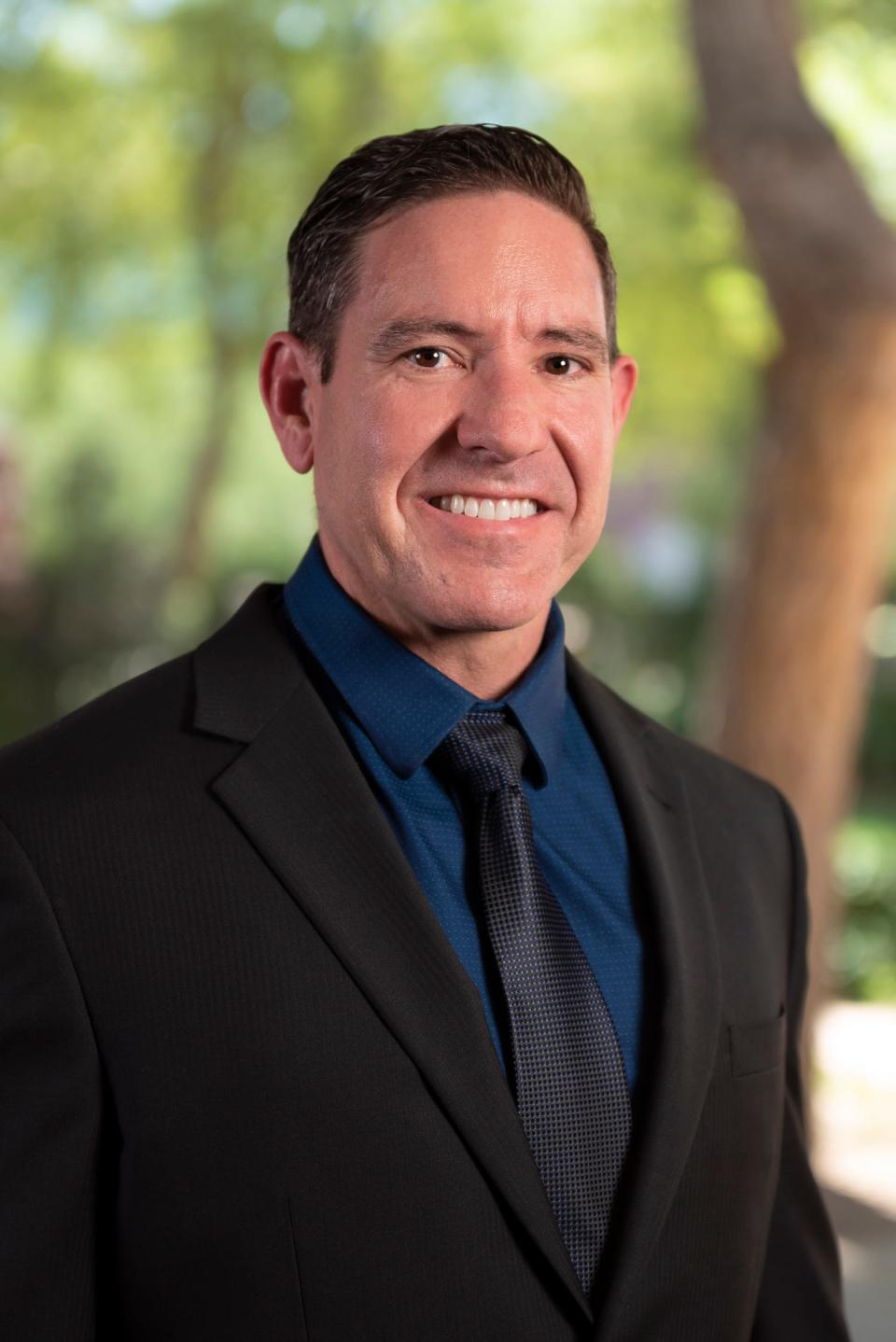Glendale man says he's target of new rule to limit blight complaints
Glendale is capping how many times a resident can complain about blight, parked cars or any other code violations.
Residents looking to the city to deal with such problems are now limited to filing only two complaints a week, down from the previous weekly threshold of five submissions.
The rule change, which took effect this month, also bars residents from filing a complaint about any property further than 1 mile from their home.
City officials said this week that the updates are part of an effort to prevent people from weaponizing Glendale’s reporting apparatus and Code Enforcement Division against their neighbors.
“We saw some in the community using the system for something other than its intended purpose,” Deputy City Manager Rick St. John said. “And we began to recognize it and understand that it was creating discontent within the community.”
The decision will affect about six to eight people, St. John said.
One of them is Warren Wilfong. For him, residential parking violations around Glendale neighborhoods have long been an issue.
A review of some of Wilfong's complaints shows that he observed violations at homes over a mile away from his.
He’s observed numerous instances of excessive parking on driveways. He’s also quick to spot cars parked on a home’s front yard, atop dirt and landscaping.
Both examples, he says, create blight.
“Once you start parking vehicles everywhere in your front yard, well, now all you see is vehicles and no landscaping at all,” he said.
Aside from the eyesore, he said, they represent some of the same regulations he helped codify in Glendale’s municipal code.
The Ocotillo District resident is a former planning commissioner who previously sat on the city’s now-disbanded code review committee, a council-led group tasked with suggesting tweaks to rules regulating nuisances.
Now an ordinary citizen, Wilfong says the city is targeting him for repeatedly pointing out these violations. He also claims Glendale’s code compliance office isn't adequately enforcing the rules.

Like Wilfong, Councilmember Jamie Aldama is also calling the move a retaliation.
“I feel that it's structured around one of our really involved community members who happens to live in my district,” Aldama said of Wilfong.
Acknowledging that he submits many code-related concerns, Wilfong said, “I’ve been a thorn in their side for five years now.”
Asked in a follow-up email to comment on Wilfong’s claims and whether he was one individual it felt had weaponized code enforcement, St. John said Glendale’s programs and tools are routinely reviewed.
“Recommended changes to any particular program or tool are based on what we feel is best for the community and those we serve,” he stated.
How did these changes come about?
The new guidelines state that a household can only submit two complaints a week and it must relate to a property within 1 mile of the residence.
If the city receives more than two complaints from a household, it won’t take any action. The household can resubmit the complaint the following week. However, Glendale will take complaints related to health and safety hazards.
The changes, St. John said, stem from a few different reasons.

Chief among them was the concern that a few residents were misusing Glendale One, the city’s online portal and app to request non-emergency services.
The city also recently developed a new system for its inspectors. Those tasked with inspecting potential code violations were assigned specific areas, or beats, to patrol and would cycle through them every three to four months.
“That eliminates the need for the community to tell us what's going on because we're constantly in the community,” St. John said.
Among the 10,000 to 12,000 cases code enforcement handles a year, St. John. said, 40% of that is driven by complaints from residents, or roughly 4,500 annually on average. The rest represent officer-initiated cases.
How were the guidelines implemented?
While city management had informed the council of the updated rules during the closed-door session of its Feb. 27 meeting, the decision was administrative, meaning councilmembers didn’t discuss or vote publicly on the matter.
To Aldama, that’s a problem.
During that meeting, Aldama recalled leaving early because of a family matter. He found out from a resident that the change was being implemented.
“Reading the new policy is about all I know and I'm not happy with it,” said Aldama, a prospective mayoral candidate looking to unseat the long-tenured Jerry Weiers in July.
"We should get citizens’ input,” he said. “It received none of that.”
Why does Wilfong care about residential parking?
Wilfong's thorny relationship with code compliance started around 2019.
He and the department’s administrator, Tim Boling, disputed whether certain homeowners who poured concrete on their front yards, essentially creating more parking space, had done so legally.
Wilfong said those homes violated an ordinance prohibiting people from pouring concrete for expanded driveway parking after 1993. According to Wilfong, Boling was unwilling to enforce the rule, believing those homes weren't in violation.
“I confronted him about it, OK. And, of course, one thing leads to another, and he wasn't going to do anything and then we started getting some councilmembers involved,” Wilfong recalled. “That's where Councilmember (Ray) Malnar basically came up with the idea of doing the code committee.”
Convening in February 2019, the City Code Review Committee comprised a mix of councilmembers and residents who reviewed Glendale’s rules and made policy recommendations to the council.
Wilfong and Boling continued to clash publicly over other parking-related issues when the committee met. As The Arizona Republic reported, the two had gone back and forth over whether city code allowed someone to park a travel trailer in their front driveway.
The temporary committee disbanded in August 2021, but not without first asking city leaders to update regulations on residential parking.
That June, the council adopted new regulations, the same ones Wilfong tracks in Glendale.
Included in that approved ordinance was a rule that up to three cars can park on a single-family home lot. The city code caps the number of vehicles allowed outside an enclosed garage or carport at one for every 400 square feet of a home’s livable area.
It also prevents homeowners whose lot is 8,000 square feet from using more than 50% of their front yard for a driveway. If the lot is bigger than 8,000 square feet, the homeowner’s driveway cannot exceed 40% of the front yard space.
Another provision prohibits parking on landscape areas, as all vehicles must park on “dustproof” surfaces.
“The front yard was never designed for parking vehicles. It was designed for landscaping,” Wilfong said, adding, “If you're parking in your front yard, you're just dragging all that stuff out in the streets and sidewalks and everything else and you're creating dust.”
Wilfong worries about how long it takes code compliance offers to respond to complaints, particularly on weekends. By the time they do show up, he said, many non-compliant vehicles are no longer there.
“It just never stops. (I) just go out there, I take pictures, submit the complaints. I tell them that the violation happens on Saturday, Sunday, but they never inspect,” Wilfong said. “They come out on Monday morning.”
If inspectors don’t observe a violation, they close the case.
“And then I have to reopen it again,” Wilfong said.
Many of the homes Wilfong has filed complaints against are not along his street. Those homes ranged from roughly half a mile to more than 2 miles away.
But issues like these matter to Wilfong, regardless of the distance to his front door. If the rules are not enforced, others might see neighbors parking on their lawns and think that's acceptable, he said.
“If I don't care, it might race to my area,” Wilfong said, defending his complaints.
“Granted, they might not be in my area, but I might drive by, see it, so I should have the right to address it,” he added. “To me, if I see something like that, where like 20 or 30 cars are in the front yard, that's an eyesore.”
Who are these new guidelines for?
The new limit on complaints has Aldama feeling uncomfortable because of its apparent structuring around Wilfong, the councilmember said.
Aldama said he appreciates Wilfong’s tenacity.
“We want people to be proactive,” he said, adding, “But when he pushes back to the city, the city pushes back to him, and this is one way of pushing back and I'm not comfortable with it.”
The change undermines the goal of relying on residents to act as volunteers who assist code enforcement and address the city’s needs, Aldama said.
“It removes that ability from citizens to want to clean up their neighborhoods,” Aldama said, adding, “It's only been an issue that's been circled around Mr. Wilfong. Other than that, it's not citywide that we have an issue.”
In a prepared statement, Councilmember Lauren Tolmachoff noted code enforcement’s importance in Glendale. She added that the city should be held accountable when it fails to meet standards established in ordinances.
“I admittedly have high expectations of city code officials, as I do for myself and all employees that serve our residents,” she stated. “I do not agree with punishing any resident for also having high expectations. We work for them.”
The rest of the council was not immediately available to respond to requests seeking comment. Mayor Weiers did not respond to The Republic’s emailed questions.
For most Glendale residents, the new rules won’t have an impact, St. John said.
The new regulations will affect “only a very, very, very small few people,” he stressed. “Those are the bigger offenders.”
“We weren't trying to keep people from being able to reach out to the city and file complaints,” he continued. “We were just trying to put some controls in place, so it didn't get out of hand.”
Shawn Raymundo covers the West Valley cities of Glendale, Peoria and Surprise. Reach him at sraymundo@gannett.com or follow him on X @ShawnzyTsunami.
This article originally appeared on Arizona Republic: Glendale limits weekly complaints residents file for code violations

